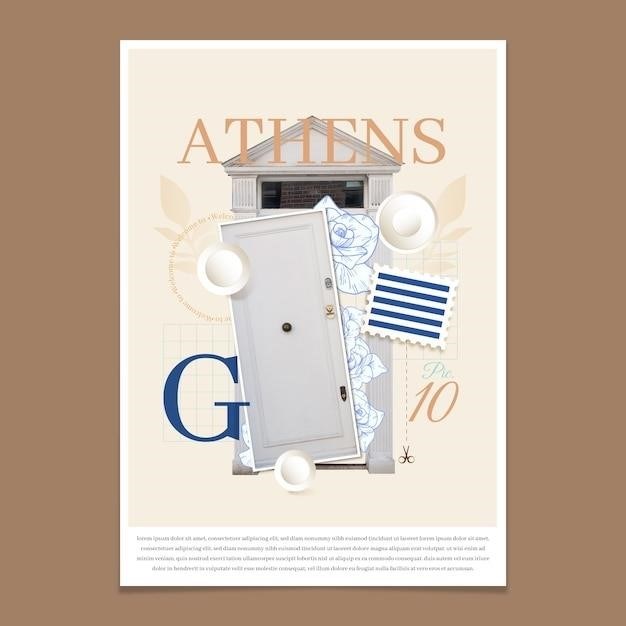
The Iliad of Homer⁚ Richmond Lattimore’s Translation
Richmond Lattimore’s translation of Homer’s Iliad has been a standard for decades, offering a faithful and engaging rendition of this epic poem. It has been praised for its clarity, accuracy, and poetic beauty, making it a valuable resource for students and general readers alike.
A Classic Translation
Richmond Lattimore’s translation of The Iliad, first published in 1951, has earned its place as a classic. It stands out for its fidelity to the original Greek text while maintaining a flowing and poetic style in English. Lattimore’s approach emphasizes both the epic grandeur and the intimate human drama at the heart of Homer’s poem. His translation has been widely praised for its accuracy, clarity, and poetic resonance, capturing the essence of Homer’s language and storytelling. It remains a highly regarded and widely used translation, offering a compelling and insightful reading experience for generations of readers.
Availability and Formats
Richmond Lattimore’s translation of The Iliad is readily available in various formats, ensuring accessibility for a wide range of readers. Printed editions can be found in bookstores and online retailers, often in both paperback and hardcover formats. Digital versions, including PDF and ePUB formats, are also available through online libraries, retailers, and digital platforms like Kindle. Many public and university libraries offer access to Lattimore’s translation in their physical collections and online databases. This widespread availability makes it easy for anyone to explore the timeless story of the Trojan War through Lattimore’s masterful translation.
Key Features of the Translation
Lattimore’s translation is lauded for its fidelity to the original Greek text while retaining a poetic and engaging style. He employs a rhythmic, almost conversational tone that brings the epic story to life in English. His translation avoids overly archaic language, making the text accessible to modern readers without sacrificing the grandeur of the original. Lattimore’s work is known for its clarity and precision, accurately conveying the nuances of Homer’s language and the complexities of the characters. His translation has been praised for its ability to capture the epic scope and emotional depth of The Iliad, making it a definitive and enduring rendition of this classic work.
Critical Reception and Impact
Lattimore’s translation of The Iliad was met with widespread acclaim upon its publication in 1951. Critics praised its accuracy, poetic language, and accessibility. It quickly became a standard text for scholars and general readers alike, establishing itself as a definitive translation for generations. Lattimore’s work has had a profound impact on the study of Homer, influencing subsequent translations and analyses. Its enduring popularity and critical recognition underscore its significance as a masterpiece of translation and a key resource for understanding Homer’s epic masterpiece.
The Iliad in Context
The Iliad, composed in ancient Greece, offers a glimpse into a world of war, honor, and the complex relationship between mortals and gods. The poem is set during the Trojan War, a conflict that had captivated the imaginations of the Greeks for centuries. Homer’s epic tale explores themes of anger, revenge, and the consequences of human actions. It also reflects the social and cultural values of ancient Greek society, with its emphasis on honor, heroism, and the role of the gods in human affairs. The Iliad remains a timeless work, offering insights into the human condition and the enduring power of storytelling.
The Trojan War and its Significance
The Trojan War, as depicted in The Iliad, was a pivotal event in Greek mythology and literature. The conflict arose from the abduction of Helen, the wife of Menelaus, King of Sparta, by Paris, the Trojan prince. This act sparked a decade-long war between the Greeks and the Trojans, culminating in the destruction of Troy. The Trojan War became a symbol of human ambition, the consequences of betrayal, and the enduring power of love and loss. It also served as a source of inspiration for later Greek writers, artists, and playwrights, shaping the cultural landscape of ancient Greece and beyond.
Homer’s Epic Poetry
Homer’s epic poetry, including The Iliad and The Odyssey, stands as a cornerstone of Western literature. These poems are characterized by their grand scope, intricate plots, and vivid portrayal of human emotions and experiences. Homer’s work reflects the values and beliefs of ancient Greek society, exploring themes of honor, courage, loyalty, and the role of fate in human affairs. His poetry is renowned for its lyrical beauty, masterful use of language, and enduring relevance, continuing to captivate readers centuries after its creation.
Themes and Motifs in the Iliad
The Iliad explores a multitude of themes and motifs that resonate deeply with readers even today. The central theme of the poem is the destructive nature of anger and the consequences of uncontrolled rage, as exemplified by Achilles’ wrath. Other prominent themes include honor, loyalty, courage, and the relationship between mortals and gods. Recurring motifs throughout the poem include the importance of hospitality, the role of fate, and the transformative power of grief. These themes and motifs are intricately woven into the narrative, creating a complex and timeless tapestry of human experience.
The Role of the Gods
The gods play a significant role in The Iliad, actively intervening in the affairs of mortals and influencing the course of the war. They are not impartial observers but rather powerful beings with their own agendas and desires, often manipulating events for their own amusement or to fulfill personal vendettas. The gods’ involvement in the war adds a layer of complexity to the narrative, highlighting the unpredictable nature of fate and the powerlessness of mortals in the face of divine intervention. This constant interplay between humans and gods creates a dynamic and engaging story that explores the limits of human agency and the capriciousness of the divine.
The Significance of Achilles
Achilles, the central figure of The Iliad, is a complex and multifaceted hero whose actions drive the narrative. His anger and desire for revenge, fueled by the death of his beloved friend Patroclus, become the driving force behind the war’s most pivotal events. He embodies both the ideals of a warrior culture – strength, courage, and honor – and the destructive consequences of unchecked rage. His story raises questions about the nature of heroism, the cost of glory, and the complex interplay between personal ambition and the greater good. Achilles’ tragic flaw, his pride, ultimately leads to his own downfall, highlighting the fragility of even the greatest hero’s power.

Resources for Accessing the Iliad
Finding Richmond Lattimore’s translation of The Iliad is easier than ever, with numerous online libraries, publishers, and digital formats available.
Online Libraries and Archives
The Internet Archive is a valuable resource for accessing The Iliad in Lattimore’s translation. This digital library offers a wealth of public domain materials, including books, texts, and audio recordings. You can find the full text of Lattimore’s Iliad in PDF format, allowing for convenient access and reading on various devices. Another option is Open Library, boasting a vast collection of over 1 million eBooks. Open Library’s mission is to make all books available to all people, and it offers a variety of formats, including PDF, for many works.
While both the Internet Archive and Open Library are excellent resources, it’s important to note that the availability of specific books and formats can change. Always check the website for the most up-to-date information and to ensure that Lattimore’s Iliad is currently available in the desired format. These online libraries provide a convenient and accessible way to experience this classic translation of Homer’s epic poem.
University Presses and Publishers
The University of Chicago Press holds a distinguished history of publishing scholarly works, including Richmond Lattimore’s translation of The Iliad. This press, established in 1892, has a reputation for producing high-quality books for scholars, students, and general readers. Their website often offers downloadable PDFs of their publications, though availability may vary depending on the specific book and copyright restrictions. You can check the University of Chicago Press website for information on purchasing or accessing their editions of Lattimore’s Iliad, including potential PDF options.
In addition to the University of Chicago Press, other university presses and publishers might offer digital formats of Lattimore’s Iliad. Exploring online booksellers and searching for the title with “PDF” or “digital” in the search terms can help you find available options. Remember that copyright regulations and licensing agreements may limit the accessibility of certain digital editions, so always consult the publisher’s website or terms of service for specific details.
Digital Formats and Download Options
The digital landscape offers a variety of ways to access Richmond Lattimore’s translation of The Iliad in PDF format; Online libraries and archives, such as the Internet Archive, may provide free digital copies of the book. Be aware that access to these resources may be subject to copyright restrictions or licensing agreements. Exploring the Internet Archive’s vast collection and searching for “The Iliad” by Homer, translated by Richmond Lattimore, might lead you to a downloadable PDF.
Commercial online booksellers, like Amazon, often offer digital editions of The Iliad, including the Lattimore translation, in various formats, including PDF. These platforms typically require purchase, but provide a convenient and reliable way to obtain the book. You can also check the websites of university presses and publishers who have published Lattimore’s translation for information on digital formats and download options. Remember to verify copyright and licensing information before downloading any digital edition to ensure legal compliance.
Commentary and Analysis
To delve deeper into Richmond Lattimore’s translation of The Iliad, consider exploring the wealth of commentary and analysis available. Academic journals and scholarly websites often feature articles and essays examining Lattimore’s work, its strengths, and its impact on the study of Homer. These resources can provide valuable insights into the translation process, the choices Lattimore made, and the critical reception of his work.
Furthermore, numerous books have been written specifically on Homer’s Iliad and its translations. These works may offer detailed analyses of Lattimore’s translation, comparing it to other versions and exploring its merits and limitations. Additionally, look for commentaries on Homer’s Iliad that specifically address the Lattimore translation, providing chapter-by-chapter insights and explanations. Such resources can enhance your understanding of the text and broaden your appreciation of Lattimore’s contribution to the study of this epic poem.